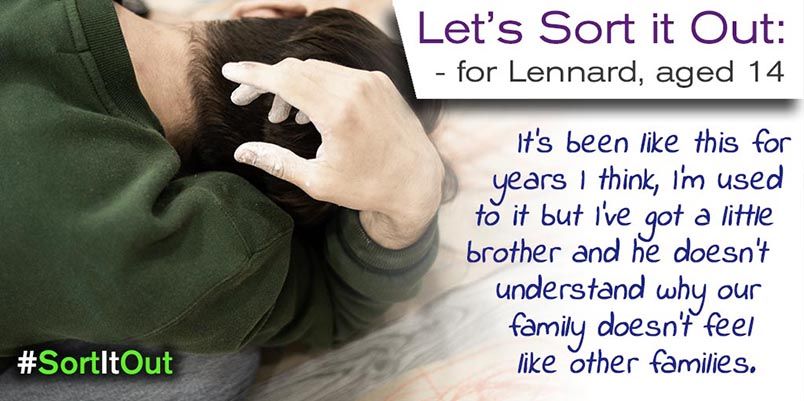The #SortItOut Campaign
A campaign to stop children being harmed by ongoing conflict between their parents.

Rationale for the campaign
Research overwhelmingly demonstrates that exposure to frequent, intense and poorly resolved conflict between parents has a long-lasting and negative effect on children's mental health and development.1
Indeed, how “couples communicate and engage with each other in managing relationship conflicts both affects their ability to engage in effective parenting practices and can influence children’s mental health outcomes in infancy, childhood, and adolescence, with extended impacts on academic/educational attainment, physical health and well-being, employability, and future relationship stability in later life”.2
1.25 million children in Britain are exposed to interparental conflict.3
We want this to change, and it can.
We would like to see the Government fund local services which seek to address parental conflict
#SortItOut campaign asks
We are calling on the Government to :
- extend the successful Reducing Parental Conflict Programme so that it is available to far more families across the UK and includes a focus on prevention, encouraging parents to seek help before their relationship falls into conflict;
- ensure that assessing for parental conflict is made part of the assessment framework for child and adolescent mental health services, in children, young people and families counselling services, and in schools;
- support local authorities, family hubs, the NHS, family courts services and other settings to offer relationship support services for parents in conflict, and for parents whose relationship is heading that way.
Doing this would mean that:
- parents who find themselves in conflict would be able to take up free short-term and effective relationship support to improve the ways they communicate and to reduce the conflict between them, and that services would encourage parents to take up such support in order to be the best parents they can be;
- children's mental health services would have to ensure that their work included reducing conflict between parents. Adding couple experts to their multidisciplinary teams means that this parental couple work becomes a normal and expected element of these services. This is not the case at the moment and this needs to change for the children’s sake;
- head-teachers, teachers and teaching assistants could be trained to understand the impact which parental conflict can have on the behaviour, self-esteem and wellbeing of pupils and know where parents can find effective relationship support. Parental conflict at home stops children from being able to learn;
- family courts and agencies like CAFCASS would be able require parents in entrenched conflict to make use of the local relationship support interventions to minimise the impact of their conflict on their children. To help this to happen, we have publised the Working Together Divorce & Separation Directory (London area), which provides judges with a number of specialist services (i.e. relationship help, co-parenting help, financial help, legal help and divorce support) to which they can sign-post parents;
- the core trainings of family support workers, early help staff, social workers and others working with families would include specific modules on understanding the impact of parental conflict, and of the parental/couple subsystem, on the mental health of children and their development, as well as the importance of engaging both parents in interventions. Local Authorities would need to recognize that children exposed to parental conflict are vulnerable and that both their parents need to be offered effective help.
It would reduce, and one day end, the exposure of children to parental conflict.
Let's Sort It Out
- for Louie, aged 8:
My mum and dad spend so much time hating each other they don’t have a lot of time to love me.
- for Melanie, aged 5:
They aren’t shouters, they don’t talk at all unless I’m there. I can make them talk, especially if I break a rule like saying I don’t eat that, give me something else please.
- for Lennard, aged 14:
It’s been like this for years I think, I’m used to it but I’ve got a little brother and he doesn’t understand why our family doesn’t feel like other families.
- for Shakira, aged 14:
It’s when she picks up her phone and sighs and rolls her eyes, I know it’s my dad. I’d pay a lot of money to stop that, she just forgets that I love my dad too and I’m stuck right in the middle, trying to make it ok for them both.
- for Paul, aged 17:
I’ve never had a parent notice what they’re doing. I think what happens is that they blame the other parent. So this parent will say the reason you’re not doing well in school, the reason you’re upset, is because this parent is not doing this, so I’ve never had a parent take responsibility for something they’ve done, it’s always the other parent’s fault.
How to support this campaign
If you would like your organisation to be listed as a supporter for this campaign, please send the name of your organisation and a contact email address to Richard Meier at
If you would like to support this campaign as an individual and would be happy for your name to be listed on this webpage, please email your name, job title and email address to Richard Meier at
References
1 Harold G, Acquah D, Sellers R, and Chowdry H (2016) What works to enhance inter-parental relationships and improve outcomes for children? DWP ad hoc research report no. 32. London: DWP.
2 Harold G, Acquah D, Sellers R, and Chowdry H (2016) What works to enhance inter-parental relationships and improve outcomes for children? DWP ad hoc research report no. 32. London: DWP.
3 Presentation to the All Party Parliamentary Group for Strengthening Couple Relationships and Reducing Interparental Conflict, 21st September 2020